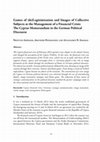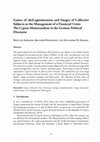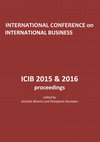Papers by Tony N Aspriadis

Aspriadis N. and Paravantis J. (2016). The Chicken Game Strategy in the European Discourse The Case of the Euro-group negotiations for Greece. Conference Proceedings. Europe in Discourse Conference. 23-25 September, 2016
This paper explores the way in which the representatives of Greece and Germany employed game theo... more This paper explores the way in which the representatives of Greece and Germany employed game theory rhetorically and transformed the game of chicken into a rhetorical strategy sending messages that aimed at the construction of specific perceptions about the otherness, to frame the negotiation process. The rhetorical strategies that were used by the Ministers of Economy of Greece and Germany (Drs. Yanis Varoufakis and Wolfgang Schäuble respectively) during the heated negotiation of Greece and Europe, are considered part of a general strategic communication plan to build perceptions, images and alliances within the Eurogroup and the Eurozone and lead the process to a desired outcome. In the framework of the campaign mode of the two parties, game theoretic tools were employed as a means of strategic communication to prime certain aspects of conflict and become part of the general strategy. The main research hypothesis is that the employment of the rhetorical strategies (such as risk, threat, values, fear appeal, fearmongering, attack and defense) may construct the concept of the strategies followed in the game of chicken through the use of strategic communication tools.

The Cypriot financial crisis of February 2013 opened a new chapter in the island’s history and ch... more The Cypriot financial crisis of February 2013 opened a new chapter in the island’s history and changed the perception of the Cyprus Problem. In this sense, the financial crisis was perceived as a continuation of the Greek crisis, which was at its peak, and drew all the negative frames, aspects and stereotypes from it. Germany played a key role in image formation of the island through the attribution of blame in German political discourse. For almost two months, German political parties debated the issue, forming an image of the country through their criticism, rhetoric and blame game. From being a victim of Turkish imperialism, Cyprus became an abuser of the eurozone. The construction of a new image for Cyprus in German political discourse was achieved through the use of contradicting dipoles, image restoration strategies and blame game. The induction of these means ofstrategic communication in the political discourse marked the parties’ campaign mode in the intra-national and the i...
Στρατηγική Επικοινωνία και Διαχείριση Κρίσεων: Η Περίπτωση της United Airlines., 2017
Ασπριάδης, Ν. & Μπαρμπαγιάννης, Ε.Α (2017). Στρατηγική Επικοινωνία
και Διαχείριση Κρίσεων: Η Περί... more Ασπριάδης, Ν. & Μπαρμπαγιάννης, Ε.Α (2017). Στρατηγική Επικοινωνία
και Διαχείριση Κρίσεων: Η Περίπτωση της United Airlines. Περιοδικό Δημοσιογραφία. Τεύχος 15, σελ. 52. https://dimosiografia.com/united-airlines/
Ασπριάδης, Ν. & Τζουρούνη, Ξ. (2016). «Ο Ρήτορας του Σπίλωνε τον Αντίπαλο: Η Στρατηγική της Εικόν... more Ασπριάδης, Ν. & Τζουρούνη, Ξ. (2016). «Ο Ρήτορας του Σπίλωνε τον Αντίπαλο: Η Στρατηγική της Εικόνας στον Προεκλογικό Λόγο του Ντόναλτ Τραμπ» Δημοσιογραφία, τεύχος 12, σελ.52-55

Aspriadis N., Papaioannou A. and Samaras Ath. (2017). Games of (de)
legitimization and Images of ... more Aspriadis N., Papaioannou A. and Samaras Ath. (2017). Games of (de)
legitimization and Images of Collective Subjects at the Management of a
Financial Crisis: The Cyprus Memorandum in the German Political Discourse. The Cyprus Review. Vol. 29. pp. 19- 41
Abstract
The Cypriot financial crisis of February 2013 opened a new chapter in the island's history and changed the perception of the Cyprus Problem. In this sense, the financial crisis was perceived as a continuation of the Greek crisis, which was at its peak, and drew all the negative frames, aspects and stereotypes from it. Germany played a key role in image formation of the island through the attribution of blame in German political discourse. For almost two months, German political parties debated the issue, forming an image of the country through their criticism, rhetoric and blame game. From being a victim of Turkish imperialism, Cyprus became an abuser of the eurozone. The construction of a new image for Cyprus in German political discourse was achieved through the use of contradicting dipoles, image restoration strategies and blame game. The induction of these means of strategic communication in the political discourse marked the parties' campaign mode in the intra-national and the international political levels.

Aspriadis N. and Paravantis J. (2016). The Chicken Game Strategy in the European Discourse The Case of the Euro-group negotiations for Greece. Conference Proceedings. Europe in Discourse Conference. 23-25 September , 2016
This paper explores the way in which the representatives of Greece and Germany employed game theo... more This paper explores the way in which the representatives of Greece and Germany employed game theory rhetorically and transformed the game of chicken into a rhetorical strategy sending messages that aimed at the construction of specific perceptions about the otherness, to frame the negotiation process. The rhetorical strategies that were used by the Ministers of Economy of Greece and Germany (Drs. Yanis Varoufakis and Wolfgang Schäuble respectively) during the heated negotiation of Greece and Europe, are considered part of a general strategic communication plan to build perceptions, images and alliances within the Eurogroup and the Eurozone and lead the process to a desired outcome. In the framework of the campaign mode of the two parties, game theoretic tools were employed as a means of strategic communication to prime certain aspects of conflict and become part of the general strategy. The main research hypothesis is that the employment of the rhetorical strategies (such as risk, threat,
values, fear appeal, fearmongering, attack and defense) may construct the concept of the strategies followed in the game of chicken through the use of strategic communication tools.

Λέξεις Κλειδιά: Στρατηγική Επικοινωνία, Κρίσης της Ουκρανίας, Ρωσία, Ερμηνευτικά πλαίσια, λογική ... more Λέξεις Κλειδιά: Στρατηγική Επικοινωνία, Κρίσης της Ουκρανίας, Ρωσία, Ερμηνευτικά πλαίσια, λογική της εκστρατείας, Επικοινωνιακός Πόλεμος,
Περίληψη
Η κρίση της Ουκρανίας αποτέλεσε ένα σημαδιακό γεγονός για την διεθνή κοινότητα και τους μελετητές των διεθνών σχέσεων. Με την κρίση αυτή επανέρχεται στο διεθνές προσκήνιο η Ρωσία και εγκαινιάζει μια νέα εποχή συγκρούσεων με πρότυπα ψυχρού πολέμου. Η σύγκρουση ανάμεσα στις μεγάλες δυνάμεις διεξάγεται σε επίπεδο επικοινωνίας και έχει σαν στόχο τον επηρεασμό της κοινής γνώμης του αντίπαλου.
Η δύση και η Ρωσία επιστρατεύουν μεθόδους προπαγάνδας και στρατηγικής επικοινωνίας με στόχο την συσπείρωση του εσωτερικού τους μετώπου αλλά και την διάλυση του μετώπου του αντίπαλου. Η χρήση της στρατηγικής επικοινωνίας σε επίπεδο σκληρής πολιτικής μαζί με την απουσία πολεμικών επιχειρήσεων αποτέλεσε κύριο χαρακτηριστικό της σύγκρουσης.
Η παρούσα έρευνα εξετάζει μέσα από την ανάλυση των ερμηνευτικών πλαισίων που κινητοποιήθηκαν από τις δύο πλευρές κατά την κρίση, την χρήση της στρατηγικής επικοινωνίας και την προσπάθεια επηρεασμού της κοινής γνώμης του αντιπάλου.
Σε αυτό το πλαίσιο χρησιμοποιούνται τα αναλυτικά εργαλεία της Ερμηνευτικής πλαισίωσης (Framing Theory) και της λογικής της εκστρατείας (campaign mode) προκειμένου να δοθεί σφαιρικά ο τρόπος με τον οποίο η στρατηγική επικοινωνία και η σύγκρουση χρησιμοποιούνται στρατηγικά για να καθορίσουν και να επιτύχουν αντικειμενικού σκοπούς.
Για τους αναλυτικούς σκοπούς της έρευνας χρησιμοποιήθηκε η ποιοτική ανάλυση περιεχομένου η οποία βασίστηκε στις δημόσιες τοποθετήσεις των βασικών πρωταγωνιστών της κρίσης (Πρόεδροι Πούτιν και Ομπάμα, Γενικός Γραμματέας ΝΑΤΟ) καθώς και στις τοποθετήσεις αυτών στο δυτικό τύπο (New York Times, BBC, CNN και Reuters). Η συγκέντρωση του υλικού έγινε με την διαδικασία παρακολούθησης του τύπου (Media Monitoring) και η ανάλυση πραγματοποιήθηκε στο υλικό αυτό.
Η περίοδος ανάλυσης έγινε από τον Ιανουάριο 2014, όπου πραγματοποιήθηκαν και οι πρώτες καταγραφές της κρίσης στην Ουκρανίας έως τον Ιούλιο 2014 όπου παρατηρήθηκε μία πρώτη αποκλιμάκωση της κρίσης.
Οι επιχειρήσεις στρατηγικής επικοινωνίας στην κρίσης της Ουκρανίας που χρησιμοποιήθηκαν από τις α... more Οι επιχειρήσεις στρατηγικής επικοινωνίας στην κρίσης της Ουκρανίας που χρησιμοποιήθηκαν από τις αντιμαχόμενες πλευρές με στόχο την επηρροή στο "μυαλό και την καρδιά" της διεθνούς κοινής γνώμης.
Interviews and Research Presentations in the Press by Tony N Aspriadis
Σο Παίγνιο Απόδοςθσ Ευκυνϊν ςτθν Τπόκεςθ του Μ. Λιάπθ Σο "αόρατο" πολιτικό παιχνίδι, πίςω από τισ... more Σο Παίγνιο Απόδοςθσ Ευκυνϊν ςτθν Τπόκεςθ του Μ. Λιάπθ Σο "αόρατο" πολιτικό παιχνίδι, πίςω από τισ πλαςτζσ πινακίδεσ που "φόρεςε" ςτο πολυτελζσ αυτοκίνθτό του ο πρϊθν υπουργόσ Μεταφορϊν Μ. Λιάπθσ, μπικε ςτο "μικροςκόπιο" τθσ Ομάδασ Ζρευνασ "Ρθτορικι, Επικοινωνία και Πεικϊ" του Πανεπιςτθμίου Πειραιά. Μζςα από τα δθμοςιεφματα διαφαίνεται ότι παρά το γεγονόσ ότι ο πρϊθν υπουργόσ επιχείρθςε να κζςει τον εαυτό του ςτθ κζςθ του απλοφ πολίτθ, ηθτϊντασ τθν επιείκεια, απζτυχε να δθμιουργιςει ςυνταφτιςθ, ενϊ ςε επίπεδο κομμάτων παίχτθκε ζνα πολιτικό "μπιλιάρδο" με πολλζσ καραμπόλεσ.
Μάθαμε να ζούμε με τον φόβο, ή μήπως μας έμαθαν; Η κρίση έφερε τον φόβο στην καθημερινότητά μας. ... more Μάθαμε να ζούμε με τον φόβο, ή μήπως μας έμαθαν; Η κρίση έφερε τον φόβο στην καθημερινότητά μας. Μέσω του φόβου φαίνεται ότι κάποιοι επιχειρούν να κυβερνήσουν, είτε συμβαίνει αυτό σε τοπικό είτε σε διεθνές επίπεδο.
Βενιζέλος Κώστας (10/04/2018). «Παιχνίδια Γερμανών με την Εικόνα της Κύπρου – Πως Νομιμοποιήθηκε ... more Βενιζέλος Κώστας (10/04/2018). «Παιχνίδια Γερμανών με την Εικόνα της Κύπρου – Πως Νομιμοποιήθηκε το Μνημόνιο: Μετατροπή της Χώρας από Θύμα σε Θύτη». Εφημερίδα Φιλελεύθερος της Κύπρου, Σελ.10. Συνέντευξη Νεόφυτου Ασπριάδη για την έρευνα: Aspriadis, N., Papaioannou, A. & Samaras, Ath. (2017). «Games of (de) legitimization and Images of Collective Subjects at the Management of a Financial Crisis: The Cyprus Memorandum in the German Political Discourse». The Cyprus Review. Vol. 29. pp. 19- 41
Conference Presentations by Tony N Aspriadis

Strategic Communication of the Greek Public Administration for the handling of the Refugee Crisis: A critical review on the Greek Institutional Speech, 2018
The Refugee Crisis has dominated the news in Greece and Europe throughout the winter 2015 and spr... more The Refugee Crisis has dominated the news in Greece and Europe throughout the winter 2015 and spring of 2016. As a matter of fact, it has managed to change for a period of time the image of Greece, spinning the financial crisis agenda. However, that did not change the fact that the great flows of immigrants and refugees constituted a crisis within a crisis for Greece. The Greek Government had to act swiftly to manage the flows and prepare the necessary infrastructure to accommodate and identify the incoming populations.
Quickly the positive image of the “hospitable” and “humane” Greece gave their place to the image of “unorganized” Greece that was not able to handle the crisis. In crisis situations, it is important to manage and maintain the control of the information environment. One important aspect in crisis management is the communicational level. In crisis situations it is of vital importance to reframe the narrative and the construction of a strong alternative perception that will keep positive attitudes towards the crisis manager and at the same time maintain his ethos as a capable manager of the situation.
In this case, the Greek government together with the regional authorities needed to keep control of the information flow and build on strategic communication messaging that would help manage effectively not only the image crisis but also subjective issues of the overall crisis.
This paper examines the Strategic Communication used by the Greek authorities and the Public Administration during the crisis. Three main questions are being discussed: What was the main strategic communication narrative in order to handle the crisis by the Greek Public Administration? How were strategically the messages constructed and how this strategy helped the strategic communication messaging. How effective were the strategic messages and narratives of the institutions and authorities in terms of crisis communication and management?
The research uses the qualitative content analysis and the crisis management and communication literature in order to examine the three main research questions. The item of the study is the Press Releases of the public administration Institutions involved in the crisis and a selective corpus of public speeches of government members and local authorities involved. The purpose is to gain an overall picture and critically examine the crisis management efforts of the Greek government and the Greek public administration at that time, concluding with lessons learned and proposing best practices for future situations.
Ποιο σύνολο στοιχείων, παραδοχών και συμπεριφορών συνθέτουν την αρχιτεκτονική της εικόνας ενός τό... more Ποιο σύνολο στοιχείων, παραδοχών και συμπεριφορών συνθέτουν την αρχιτεκτονική της εικόνας ενός τόπου και τη στρατηγική ενός brand σήμερα; Επιβάλλει το σύγχρονο περιβάλλον μια αλλαγή στους κανόνες, τις αρχές και τις αξίες που συνθέτουν την ταυτότητα ενός τόπου και την προβολής της εικόνας του διεθνώς;
Ποια είναι η ρητορική των αποσχιστικών κινημάτων; Πως διαμορφώνεται η ταυτότητα και η ετερότητα μ... more Ποια είναι η ρητορική των αποσχιστικών κινημάτων; Πως διαμορφώνεται η ταυτότητα και η ετερότητα μέσα από τη στρατηγική επικοινωνία ανάλογα με τη στοχοθεσία των πλευρών. Μία συγκριτική ανάλυση στις περιπτώσεις της Καταλωνίας και του Ηνωμένου Βασιλείου. Ποιες ήταν οι ομοιότητες και ποιες οι διαφορές στη ρητορική των πολιτικών ηγετών και της πολιτικής ελίτ στις δύο περιπτώσεις. Η έρευνα αυτή πραγματοποιήθηκε στο πλαίσιο ομιλίας στην εκδήλωση: "Συλλογικές Ταυτότητες και Αποσχιστικά κινήματα" της Φοιτητικής Οργάνωσης για τις Διεθνείς Σχέσεις (SAFIA).
Παραπομπή: Ασπριάδης Ν. (2018). Αποσχιστικά Κινήματα: Η Ρητορική Κατασκευή της Ετερότητας ως διαδικασία διαμόρφωσης της εικόνας του "άλλου" παρουσίαση στο Συνέδριο «Συλλογικές Ταυτότητες, Αυτοδιάθεση και Κινήματα Ανεξαρτησίας». Οργάνωση SAFIA. 21 Φεβρουαρίου.











Uploads
Papers by Tony N Aspriadis
και Διαχείριση Κρίσεων: Η Περίπτωση της United Airlines. Περιοδικό Δημοσιογραφία. Τεύχος 15, σελ. 52. https://dimosiografia.com/united-airlines/
legitimization and Images of Collective Subjects at the Management of a
Financial Crisis: The Cyprus Memorandum in the German Political Discourse. The Cyprus Review. Vol. 29. pp. 19- 41
Abstract
The Cypriot financial crisis of February 2013 opened a new chapter in the island's history and changed the perception of the Cyprus Problem. In this sense, the financial crisis was perceived as a continuation of the Greek crisis, which was at its peak, and drew all the negative frames, aspects and stereotypes from it. Germany played a key role in image formation of the island through the attribution of blame in German political discourse. For almost two months, German political parties debated the issue, forming an image of the country through their criticism, rhetoric and blame game. From being a victim of Turkish imperialism, Cyprus became an abuser of the eurozone. The construction of a new image for Cyprus in German political discourse was achieved through the use of contradicting dipoles, image restoration strategies and blame game. The induction of these means of strategic communication in the political discourse marked the parties' campaign mode in the intra-national and the international political levels.
values, fear appeal, fearmongering, attack and defense) may construct the concept of the strategies followed in the game of chicken through the use of strategic communication tools.
Περίληψη
Η κρίση της Ουκρανίας αποτέλεσε ένα σημαδιακό γεγονός για την διεθνή κοινότητα και τους μελετητές των διεθνών σχέσεων. Με την κρίση αυτή επανέρχεται στο διεθνές προσκήνιο η Ρωσία και εγκαινιάζει μια νέα εποχή συγκρούσεων με πρότυπα ψυχρού πολέμου. Η σύγκρουση ανάμεσα στις μεγάλες δυνάμεις διεξάγεται σε επίπεδο επικοινωνίας και έχει σαν στόχο τον επηρεασμό της κοινής γνώμης του αντίπαλου.
Η δύση και η Ρωσία επιστρατεύουν μεθόδους προπαγάνδας και στρατηγικής επικοινωνίας με στόχο την συσπείρωση του εσωτερικού τους μετώπου αλλά και την διάλυση του μετώπου του αντίπαλου. Η χρήση της στρατηγικής επικοινωνίας σε επίπεδο σκληρής πολιτικής μαζί με την απουσία πολεμικών επιχειρήσεων αποτέλεσε κύριο χαρακτηριστικό της σύγκρουσης.
Η παρούσα έρευνα εξετάζει μέσα από την ανάλυση των ερμηνευτικών πλαισίων που κινητοποιήθηκαν από τις δύο πλευρές κατά την κρίση, την χρήση της στρατηγικής επικοινωνίας και την προσπάθεια επηρεασμού της κοινής γνώμης του αντιπάλου.
Σε αυτό το πλαίσιο χρησιμοποιούνται τα αναλυτικά εργαλεία της Ερμηνευτικής πλαισίωσης (Framing Theory) και της λογικής της εκστρατείας (campaign mode) προκειμένου να δοθεί σφαιρικά ο τρόπος με τον οποίο η στρατηγική επικοινωνία και η σύγκρουση χρησιμοποιούνται στρατηγικά για να καθορίσουν και να επιτύχουν αντικειμενικού σκοπούς.
Για τους αναλυτικούς σκοπούς της έρευνας χρησιμοποιήθηκε η ποιοτική ανάλυση περιεχομένου η οποία βασίστηκε στις δημόσιες τοποθετήσεις των βασικών πρωταγωνιστών της κρίσης (Πρόεδροι Πούτιν και Ομπάμα, Γενικός Γραμματέας ΝΑΤΟ) καθώς και στις τοποθετήσεις αυτών στο δυτικό τύπο (New York Times, BBC, CNN και Reuters). Η συγκέντρωση του υλικού έγινε με την διαδικασία παρακολούθησης του τύπου (Media Monitoring) και η ανάλυση πραγματοποιήθηκε στο υλικό αυτό.
Η περίοδος ανάλυσης έγινε από τον Ιανουάριο 2014, όπου πραγματοποιήθηκαν και οι πρώτες καταγραφές της κρίσης στην Ουκρανίας έως τον Ιούλιο 2014 όπου παρατηρήθηκε μία πρώτη αποκλιμάκωση της κρίσης.
Interviews and Research Presentations in the Press by Tony N Aspriadis
Conference Presentations by Tony N Aspriadis
Quickly the positive image of the “hospitable” and “humane” Greece gave their place to the image of “unorganized” Greece that was not able to handle the crisis. In crisis situations, it is important to manage and maintain the control of the information environment. One important aspect in crisis management is the communicational level. In crisis situations it is of vital importance to reframe the narrative and the construction of a strong alternative perception that will keep positive attitudes towards the crisis manager and at the same time maintain his ethos as a capable manager of the situation.
In this case, the Greek government together with the regional authorities needed to keep control of the information flow and build on strategic communication messaging that would help manage effectively not only the image crisis but also subjective issues of the overall crisis.
This paper examines the Strategic Communication used by the Greek authorities and the Public Administration during the crisis. Three main questions are being discussed: What was the main strategic communication narrative in order to handle the crisis by the Greek Public Administration? How were strategically the messages constructed and how this strategy helped the strategic communication messaging. How effective were the strategic messages and narratives of the institutions and authorities in terms of crisis communication and management?
The research uses the qualitative content analysis and the crisis management and communication literature in order to examine the three main research questions. The item of the study is the Press Releases of the public administration Institutions involved in the crisis and a selective corpus of public speeches of government members and local authorities involved. The purpose is to gain an overall picture and critically examine the crisis management efforts of the Greek government and the Greek public administration at that time, concluding with lessons learned and proposing best practices for future situations.
Παραπομπή: Ασπριάδης Ν. (2018). Αποσχιστικά Κινήματα: Η Ρητορική Κατασκευή της Ετερότητας ως διαδικασία διαμόρφωσης της εικόνας του "άλλου" παρουσίαση στο Συνέδριο «Συλλογικές Ταυτότητες, Αυτοδιάθεση και Κινήματα Ανεξαρτησίας». Οργάνωση SAFIA. 21 Φεβρουαρίου.
και Διαχείριση Κρίσεων: Η Περίπτωση της United Airlines. Περιοδικό Δημοσιογραφία. Τεύχος 15, σελ. 52. https://dimosiografia.com/united-airlines/
legitimization and Images of Collective Subjects at the Management of a
Financial Crisis: The Cyprus Memorandum in the German Political Discourse. The Cyprus Review. Vol. 29. pp. 19- 41
Abstract
The Cypriot financial crisis of February 2013 opened a new chapter in the island's history and changed the perception of the Cyprus Problem. In this sense, the financial crisis was perceived as a continuation of the Greek crisis, which was at its peak, and drew all the negative frames, aspects and stereotypes from it. Germany played a key role in image formation of the island through the attribution of blame in German political discourse. For almost two months, German political parties debated the issue, forming an image of the country through their criticism, rhetoric and blame game. From being a victim of Turkish imperialism, Cyprus became an abuser of the eurozone. The construction of a new image for Cyprus in German political discourse was achieved through the use of contradicting dipoles, image restoration strategies and blame game. The induction of these means of strategic communication in the political discourse marked the parties' campaign mode in the intra-national and the international political levels.
values, fear appeal, fearmongering, attack and defense) may construct the concept of the strategies followed in the game of chicken through the use of strategic communication tools.
Περίληψη
Η κρίση της Ουκρανίας αποτέλεσε ένα σημαδιακό γεγονός για την διεθνή κοινότητα και τους μελετητές των διεθνών σχέσεων. Με την κρίση αυτή επανέρχεται στο διεθνές προσκήνιο η Ρωσία και εγκαινιάζει μια νέα εποχή συγκρούσεων με πρότυπα ψυχρού πολέμου. Η σύγκρουση ανάμεσα στις μεγάλες δυνάμεις διεξάγεται σε επίπεδο επικοινωνίας και έχει σαν στόχο τον επηρεασμό της κοινής γνώμης του αντίπαλου.
Η δύση και η Ρωσία επιστρατεύουν μεθόδους προπαγάνδας και στρατηγικής επικοινωνίας με στόχο την συσπείρωση του εσωτερικού τους μετώπου αλλά και την διάλυση του μετώπου του αντίπαλου. Η χρήση της στρατηγικής επικοινωνίας σε επίπεδο σκληρής πολιτικής μαζί με την απουσία πολεμικών επιχειρήσεων αποτέλεσε κύριο χαρακτηριστικό της σύγκρουσης.
Η παρούσα έρευνα εξετάζει μέσα από την ανάλυση των ερμηνευτικών πλαισίων που κινητοποιήθηκαν από τις δύο πλευρές κατά την κρίση, την χρήση της στρατηγικής επικοινωνίας και την προσπάθεια επηρεασμού της κοινής γνώμης του αντιπάλου.
Σε αυτό το πλαίσιο χρησιμοποιούνται τα αναλυτικά εργαλεία της Ερμηνευτικής πλαισίωσης (Framing Theory) και της λογικής της εκστρατείας (campaign mode) προκειμένου να δοθεί σφαιρικά ο τρόπος με τον οποίο η στρατηγική επικοινωνία και η σύγκρουση χρησιμοποιούνται στρατηγικά για να καθορίσουν και να επιτύχουν αντικειμενικού σκοπούς.
Για τους αναλυτικούς σκοπούς της έρευνας χρησιμοποιήθηκε η ποιοτική ανάλυση περιεχομένου η οποία βασίστηκε στις δημόσιες τοποθετήσεις των βασικών πρωταγωνιστών της κρίσης (Πρόεδροι Πούτιν και Ομπάμα, Γενικός Γραμματέας ΝΑΤΟ) καθώς και στις τοποθετήσεις αυτών στο δυτικό τύπο (New York Times, BBC, CNN και Reuters). Η συγκέντρωση του υλικού έγινε με την διαδικασία παρακολούθησης του τύπου (Media Monitoring) και η ανάλυση πραγματοποιήθηκε στο υλικό αυτό.
Η περίοδος ανάλυσης έγινε από τον Ιανουάριο 2014, όπου πραγματοποιήθηκαν και οι πρώτες καταγραφές της κρίσης στην Ουκρανίας έως τον Ιούλιο 2014 όπου παρατηρήθηκε μία πρώτη αποκλιμάκωση της κρίσης.
Quickly the positive image of the “hospitable” and “humane” Greece gave their place to the image of “unorganized” Greece that was not able to handle the crisis. In crisis situations, it is important to manage and maintain the control of the information environment. One important aspect in crisis management is the communicational level. In crisis situations it is of vital importance to reframe the narrative and the construction of a strong alternative perception that will keep positive attitudes towards the crisis manager and at the same time maintain his ethos as a capable manager of the situation.
In this case, the Greek government together with the regional authorities needed to keep control of the information flow and build on strategic communication messaging that would help manage effectively not only the image crisis but also subjective issues of the overall crisis.
This paper examines the Strategic Communication used by the Greek authorities and the Public Administration during the crisis. Three main questions are being discussed: What was the main strategic communication narrative in order to handle the crisis by the Greek Public Administration? How were strategically the messages constructed and how this strategy helped the strategic communication messaging. How effective were the strategic messages and narratives of the institutions and authorities in terms of crisis communication and management?
The research uses the qualitative content analysis and the crisis management and communication literature in order to examine the three main research questions. The item of the study is the Press Releases of the public administration Institutions involved in the crisis and a selective corpus of public speeches of government members and local authorities involved. The purpose is to gain an overall picture and critically examine the crisis management efforts of the Greek government and the Greek public administration at that time, concluding with lessons learned and proposing best practices for future situations.
Παραπομπή: Ασπριάδης Ν. (2018). Αποσχιστικά Κινήματα: Η Ρητορική Κατασκευή της Ετερότητας ως διαδικασία διαμόρφωσης της εικόνας του "άλλου" παρουσίαση στο Συνέδριο «Συλλογικές Ταυτότητες, Αυτοδιάθεση και Κινήματα Ανεξαρτησίας». Οργάνωση SAFIA. 21 Φεβρουαρίου.
The rhetoric of blame, or “blame game”, refers to the processes of attribution of responsibility that arise after a failure or crisis. In such a case, actors typically try to deflect their own part of responsibility, by shifting the blame to other actors. By attributing responsibility to a personified state, the blame functions as instrument of domestication of failure, that stems from the state’s internal and stable characteristics (Weiner, 2004). Thus the personified state is self-accountable for the failure or crisis and external factors affecting or causing the failure are not examined.
Under this theoretical concept, international states, non-state actors, politicians or leaders form positive or negative images of their own state or others. Subsequently, these images are usually being formed through their narrative in a context of attack against the reputation or the image of a country in order to achieve specific objectives.
This paper explores the German narrative during the re-negotiation of the Greek rescue plan - memorandum in the Eurogroup from February until June 2015. The research focuses on the discourse of Schäuble and the image formation attitudes, demonization and blame games he employed to construct a specific image on Greece in order to achieve diplomatic goals. This qualitative content analysis in Schäuble’s discourse for a period of five months (January - June) is driven from the following research questions:
How are the procedures of personification and personalization employed in Schäuble’s discourse?
How is responsibility attributed to Greece regarding the causes of the financial crisis?
How is the image of Greece being formed through the strategies used by Schäuble?
This paper explores the incorporation of the rhetorical perspective in the study of political thought by employing strategies of apology from the field of rhetoric and attribution theory from the field of social psychology in the analysis of the blame games implicitly or explicitly incorporated into the construction of “rally effect” theories. Rally effect is strongly connected with an international crisis situation. The notion of crisis by definition signifies a failure of the administration.
In the crisis stage, the participants are divided into those who condemn the offender by demanding resti¬tution in the form of an apology, and those who support the offender by encouraging him or her to refuse such a demand (Kampf & Loewenheim, 2012: 45). Subsequently, apology has two meanings, the first with as answer to an accusation –kategoria (Simpson and Weiner,1989: 553) and the second, as an apology for a wrongdoing (Thayer, 1889; Hearit,2006). On the other hand, attribution or blame is an integral part of crisis management and a specific part of Strategy of Apology. Blame attribution is referred to a procedure of search for responsibility (Jennings, 2005: 2). Therefore, the blame game is usually taking place during crises in order to attribute or evade responsibility for the failure or the wrongdoing.
Strategies of Apology and Attribution theory are key instruments for Crisis Management. The systematic analysis of the construction of rally rhetoric in the USA suggests that there is implicit employment of strategies of apology in order to defer and or deflect the blame for the failure and explicit strategic employment of attribution processes in order to construct and demonize the opponent and wake rhetorically the emotions of public opinion that mobilize the rally effect.
The analysis focuses on presidential rhetoric in the USA at the aftermath of 11/9 and the construction of the “War Against Terrorism” discourse.
«Κοινωνία της Επιτήρησης: Από την Κυβερνοασφάλεια στα Fake News - Μέσα, Μηνύματα, Στρατηγικές»
Η συζήτηση γύρω από τις «ψευδείς ειδήσεις» είναι μια συζήτηση για τη γνώση και την αλήθεια, για την μεροληψία και την χειραγώγηση, για την τεχνολογική εξέλιξη και την ισχύ. Επιτήρηση και παρακολούθηση στον ψηφιακό κόσμο, κυβερνοασφάλεια, fake news, μέσα, μηνύματα και στρατηγικές, φόβοι των αποκαλύψεων και προβολές ισχύος, είναι ζητήματα τα οποία θα εξεταστούν διεξοδικά .
Υπό το πρίσμα του συνεδρίου θα τεθούν σύγχρονα θέματα κυβερνοασφάλειας, απειλές και στρατηγικές που χρησιμοποιούνται από κυβερνήσεις και ιδιώτες, καθώς και ποιες είναι οι σύγχρονες στρατηγικές αντιμετώπισης:
Ποια είναι η εφαρμογή του διεθνούς δικαίου για τις επιχειρήσεις στον κυβερνοχώρο;
Τι συμβαίνει στην Ευρώπη πάνω στο ζήτημα της κυβερνοασφάλειας;
Ποιος ήταν ο ρόλος των ΜΜΕ στην αναπαραγωγή των ειδήσεων για τα σκάνδαλα των Wikileaks και του Snowden;
Ποια είναι η στρατηγική χρήση του όρου fake news και πως χρησιμοποιούνται στους λόγους των ηγετών και των πολιτικών για την αποδόμηση των αντιπάλων τους;
Ποια παίγνια κυριαρχίας και ποιες συμβολικές διαμάχες διεξάγονται στην Κοινωνίας της Επιτήρησης και ποιες ρητορικές στρατηγικές ακολουθούνται;
Πώς διαχειρίζονται τις κατηγορίες για χρησιμοποίηση των fake news όσοι τις υφίστανται;
Στο συνέδριο θα συμμετέχουν έγκριτοι επιστήμονες και καθηγητές του Πανεπιστημίου Πειραιά, του Εθνικού και Καποδιστριακού Πανεπιστημίου Αθηνών, του Αριστοτελείου Πανεπιστημίου Θεσσαλονίκης, νέοι ερευνητές καθώς και επαγγελματίες του χώρου. Το Συνέδριο τελεί υπό την Αιγίδα του Μορφωτικού Ιδρύματος της ΕΣΗΕΑ.
The Strategic Communication and News Media Laboratory participated at the international conference: #AMIRetreat2017: Journalism, Society and Politics in the Digital Media Era, organized by the Advanced Media Institute, Open University of Cyprus and Cyprus University of Technology with two panels and eight research presentations. The Laboratory of Intelligence and Cyber-Security, University of Piraeus joined the panels with two more papers.This presentation includes only the abstracts of the panels and the papers of the two Laboratories that were presented at the conference.
Both theStrategic Communication and News Media Laboratory and the Laboratory of Intelligence and Cyber-Security wish to thank the organizers of the conference and especially Prof. Sofia Iordanidou for the invitation and for providing a forum for in depth academic discussions and exchange of ideas.
Panel 1: (International) Politics, News Media and Images of Nations: Image Making in the Context of Crisis.
Nation image is defined as the cognitive representation of a given country (Kunczik, 1997). There are three main forms of image-projected (i.e. the image as an attribute of the message): (a) The identity of the country as constructed and projected by strategic communication of institutions of a country. (b) The image of the country that derives from events that take place within the country and/or otherwise related with the country and (c) The journalistically mediated image, the image in the news which is produced by the combined operation of the (international) news making process, the strategies of actors and domestic and international events. Major events with long duration and high visibility operate via the processes of agenda setting and framing in order to affect the journalistically projected nation image of the countries related with the event. Aim of this panel is to examine the image of nation as constructed by the interplay of international events, domestic party -political systems, international politics and the news making process. The underlying context for all researches in this panel is that of crisis: Grexit, Brexit, Turkish Coup, Ukrainian Crisis, Refugee Crisis and the Greek Financial Crisis.
This panel is sponsored by the Strategic Communication and News Media Laboratory.
Panel 2: WikiLeaks, Snowden and the Surveillance Society: Politics, Narratives and Representations.
The ability to digitize and capture data, to publish and disseminate it worldwide without mediation by external parties provided opportunities to anyone with the inclination to harness them. Continual developments in digital technology provided the ideal catalyst for the creation of the transparency organization Wiki Leaks. In June 2013, Edward Snowden released a series of classified National Security Administration documents that revealed extensive National Security Agency (NSA) foreign and domestic surveillance activities. The disclosure of US spying programs potentially threatened the government’s ability to carry out the national security activities needed to protect a democracy while Wiki Leaks deconstruct the official political rhetoric at an international level, delegitimize political actors in several countries while it provided opportunities for embarrassment for governments at both the international and domestic level. Both cases pose the more intricate question of how to weigh the democratic expectancies of free expression and the public’s right to know versus national security needs. Snowden and WikiLeaks necessitate a conceptual and methodological outline for studying the social and political implications of digital surveillance. The papers in this panel explore the politics of surveillance society, its triangular relations with journalism and security as well as the related narratives and representations.
This panel is sponsored by the “Intelligence & Cybersecurity Laboratory” and the “Strategic Communication and News Media Laboratory”, International and European Studies Department, University of Piraeus.
Η συγκρότηση του θεωρητικού πλαισίου διέπεται από διεπιστημονικότητα και μελετά α) την ενσωμάτωση της ρητορικής διάστασης της μελέτης της πολιτικής σκέψης, β) την εφαρμογή στρατηγικών απολογίας από το πεδίο της ρητορικής και γ) την θεωρία απόδοσης ευθύνης στην ανάλυση των παιγνίων απόδοσης ευθυνών, στο διεθνές πολιτικό περιβάλλον που ενσωματώνονται, εν δυνάμει ή εγγενώς, στην κατασκευή του φαινομένου της Συσπείρωσης. Η επίδραση της Συσπείρωσης είναι στενά συνδεδεμένη με τις καταστάσεις διεθνών - διακρατικών κρίσεων. Η αντίληψη πως η κρίση αποτελεί εξ ορισμού αποτυχία της διοίκησης συνήθως οδηγεί στην επιστράτευση στρατηγικών απολογίας και απόδοση ευθυνών εκ μέρους της και εκ μέρους των αντιπάλων της, με στόχο την επικράτηση της ισχυρότερης ερμηνείας που θα κυριαρχήσει και θα διαχειριστεί το εσωτερικό μέτωπο.
Η περιπτωσιολογική ανάλυση εστιάζεται στο ρητορικό αφήγημα του πολέμου κατά της τρομοκρατίας που ξεκίνησε η αμερικανική ηγεσία μετά τα χτυπήματα της 11ης Σεπτεμβρίου 2001 και συγκεκριμένα την ρητορική που οδήγησε στον πόλεμο κατά του Αφγανιστάν και κατά του Ιράκ δύο χρόνια αργότερα (2003).
Αναστοχασμών: Εικόνες Κρατών και Πολιτιστική Διπλωματία
– Πρακτικές Εφαρμογές και Ασκήσεις», Πειραιάς: Εργαστήριο
Στρατηγικής Επικοινωνίας και Μέσων Ενημέρωσης,
Πανεπιστήμιο Πειραιώς